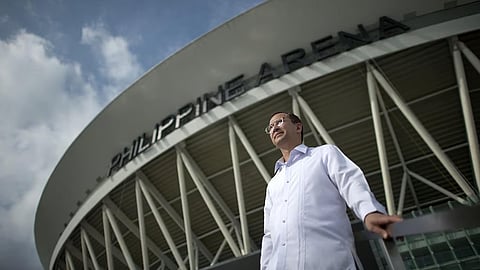
- NEWS
- the EDIT
- COMMENTARY
- BUSINESS
- LIFE
- SHOW
- ACTION
- GLOBAL GOALS
- SNAPS
- DYARYO TIRADA
- MORE

What began as a routine midterm check-in for President Ferdinand “Bongbong” Marcos Jr. has erupted into a political earthquake, upending alliances, reshaping the Senate and putting his presidency on uncertain ground.
Eight months after its formation, Marcos’ Alyansa Para Sa Bagong Pilipinas senatorial slate appeared headed to a disappointing finish at the polls, with 97.20 percent of the ballots counted.
PDP Laban drew strength from Mindanao and overseas Filipino workers who came out and voted as a bloc to turn the political tide in a way that caught many off guard.
The unexpected arrest and detention of former President Rodrigo Duterte by the International Criminal Court (ICC) last March didn’t just spark outrage across the country and beyond — it reignited his loyalist base and reshaped the political landscape.
This momentum carried five Duterte allies into the Senate, matching the number of Marcos’ Alyansa candidates with two original Liberal Party stalwarts — Bam Aquino and Francis Pangilinan — completing the Magic 12.
It was an outcome that blindsided pollsters and reaffirmed Duterte’s enduring grip on the public imagination.
Despite being detained in The Hague on charges related to his controversial war on drugs, former President Duterte remains a popular figure. His decisive victory in the Davao mayoral election reaffirms his family’s enduring influence in the region.
His fingerprint was visible in the Senate race. His allies took three of the first six spots.
Senator Christopher “Bong” Go topped the race, followed by Senator Ronald “Bato” dela Rosa in third. Rep. Rodante Marcoleta, largely considered a long shot, landed in sixth place — a testament to the enduring strength of Duterte’s political machine.
Go, the leading candidate with close to 22 million votes, was listed in all regions, topping seven, including the overseas absentee voting, where Duterte allies dominated. His performance did not come as a surprise, having led late pre-election surveys.
Dela Rosa’s candidacy was bolstered by placing second behind Go in Regions 7 to 13 and among overseas voters.
Marcoleta, who fared poorly in surveys, came out surprisingly in sixth spot. He, along with Bam Aquino and Francis Pangilinan, were the surprise packages of the election.
The Iglesia Ni Cristo (INC) once again proved its unparalleled political influence, delivering a near-perfect record in the senatorial race.
Seven of the eight INC-endorsed candidates made it into the Magic 12, including Bong Go, Ronald dela Rosa, Rodante Marcoleta, Imee Marcos, Camille Villar, Bam Aquino and Pia Cayetano. The only INC-endorsed candidate who fell short was Bong Revilla, who landed just outside the winner’s circle in 14th place.
The inclusion of Aquino and Pangilinan, both identified with the Liberal Party and former Vice President Leni Robredo, was a surprising twist.
Aquino leveraged strong INC support while Pangilinan drew support from the loyal, lingering Liberal Party base.
The Marcos administration suffered a significant blow in this election, with his official administration slate placing only five candidates in the Magic 12 — a poor showing for a sitting president.
The defection of former allies like Imee Marcos and Camille Villar to PDP–Laban has only further deepened the rift within the administration, signaling the growing influence of Sara Duterte and the fracturing of the Marcos coalition.
Cayetano, thanks to INC’s endorsement, was one of five Alyansa bets inside the Magic 12 circle. The other four Alyansa candidates who survived the Duterte political machine were former Senate President Tito Sotto, veteran lawmaker Panfilo Lacson, Senator Lito Lapid, and former broadcaster Erwin Tulfo, the highest-placed at fourth.
Vice President Sara Duterte emerged as the most influential figure of the election cycle, not only campaigning for the PDP Laban slate but also backing former Alliance allies such as Imee Marcos and Camille Villar.
By aligning with these key candidates, Duterte effectively weakened the administration’s slate, forcing Marcos to contend with the fracturing of his coalition.
The Vice President’s influence was evident in the success of her slate, with Imee Marcos and Camille Villar both finishing in the top 12, further cementing Duterte’s growing political clout.
Next battleground: The Senate
As the 2025 Senate race now fades into the background, a more pressing challenge looms on the horizon: Sara Duterte’s impeachment trial.
The Senate is set to become the next political battleground in a contest that will test Duterte’s political survival and reveal how deep the fractures run within the ruling coalition.
The impeachment charges against Sara Duterte, which stem from her handling of local governance and her political influence in Mindanao, could ignite a power struggle that will define her future and reshape the balance of power in the Philippines.
As political divisions deepen between the Marcos and Duterte factions, the Senate trial will serve as a crucial moment in determining whether the Vice President can weather the storm or if the Duterte legacy will suffer its most significant setback yet.
